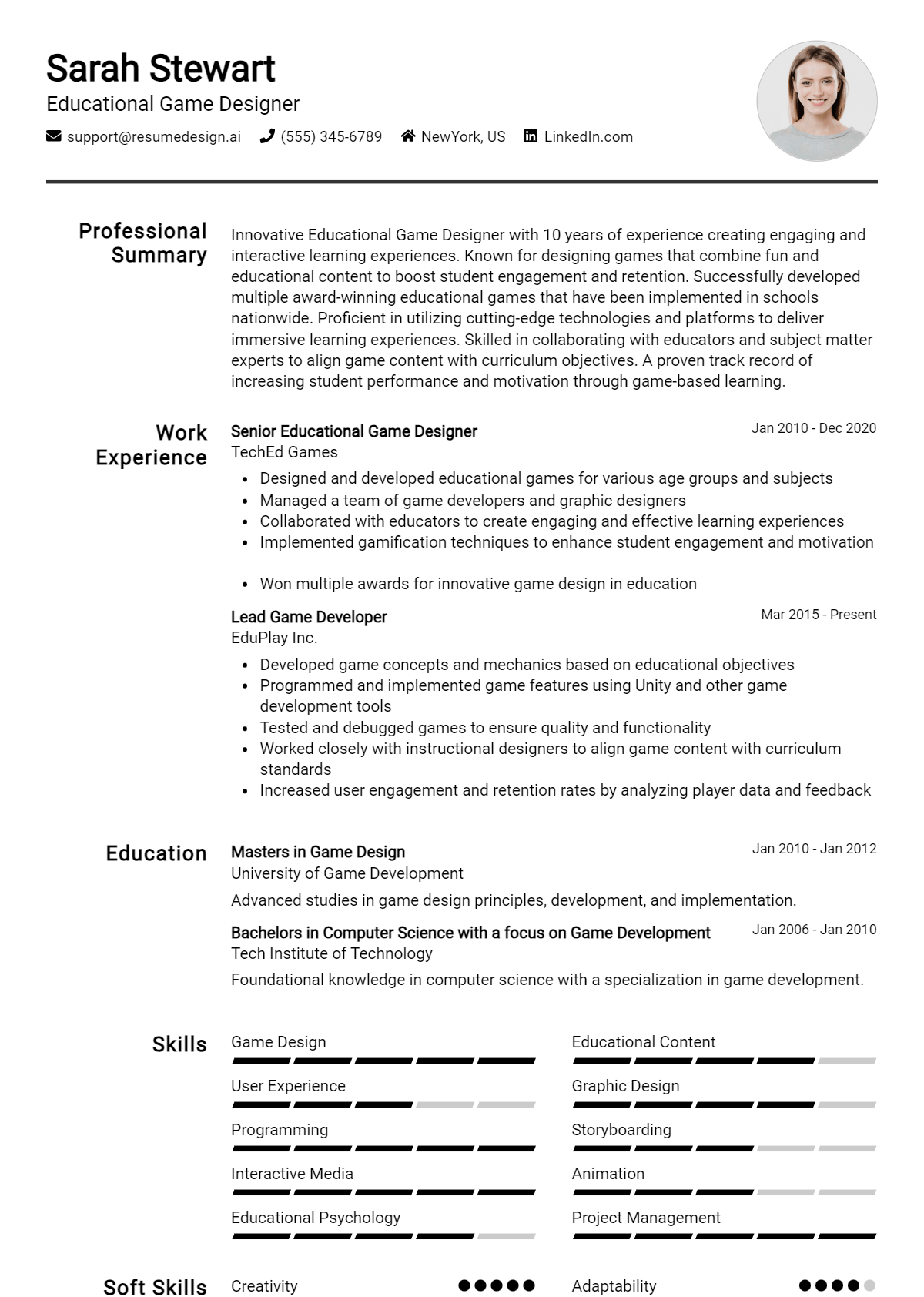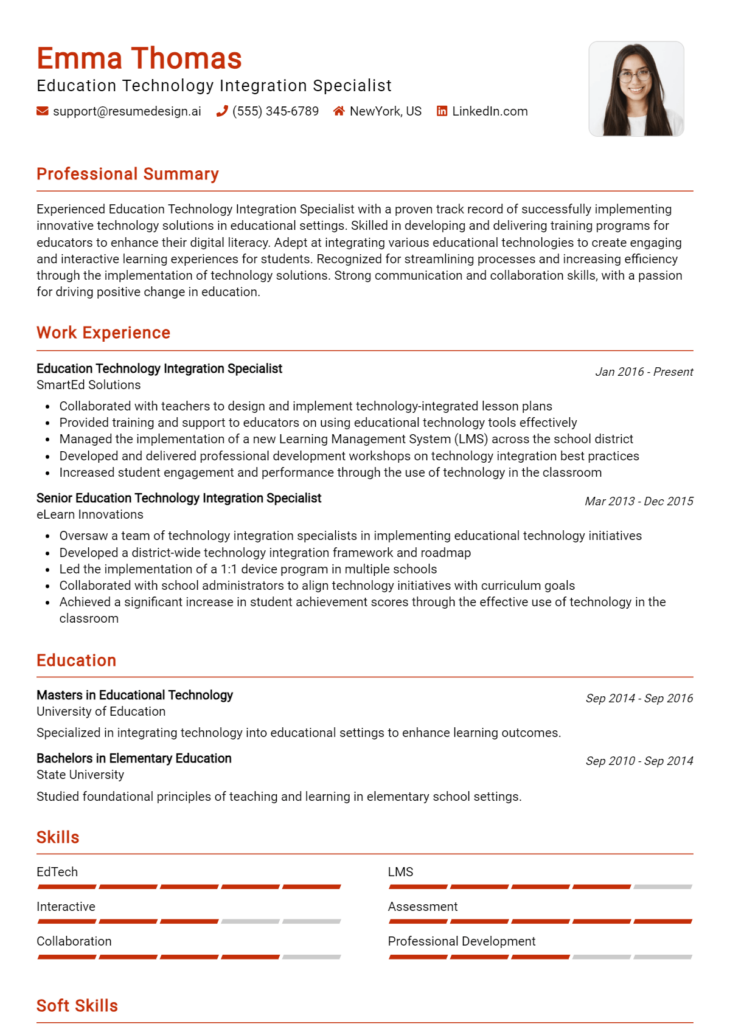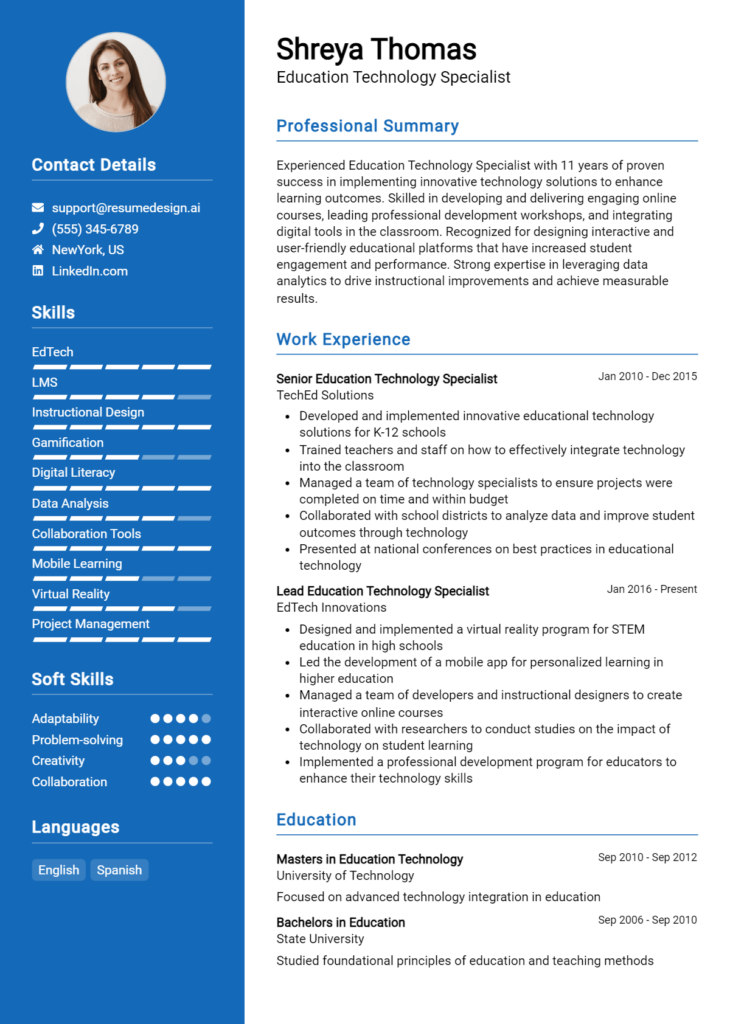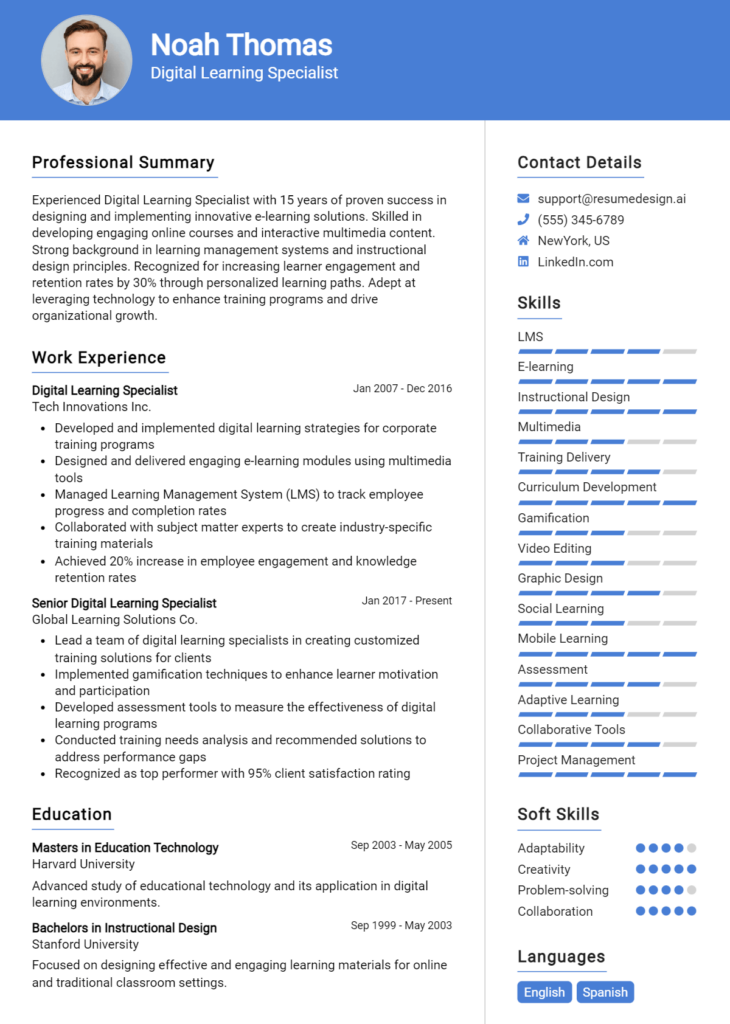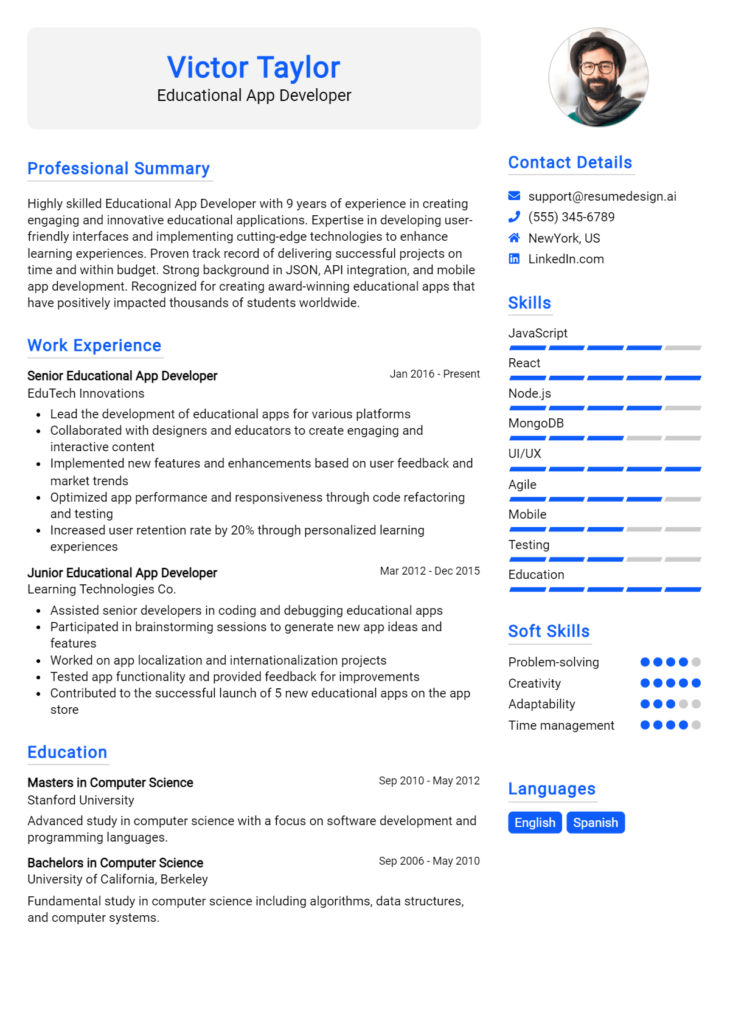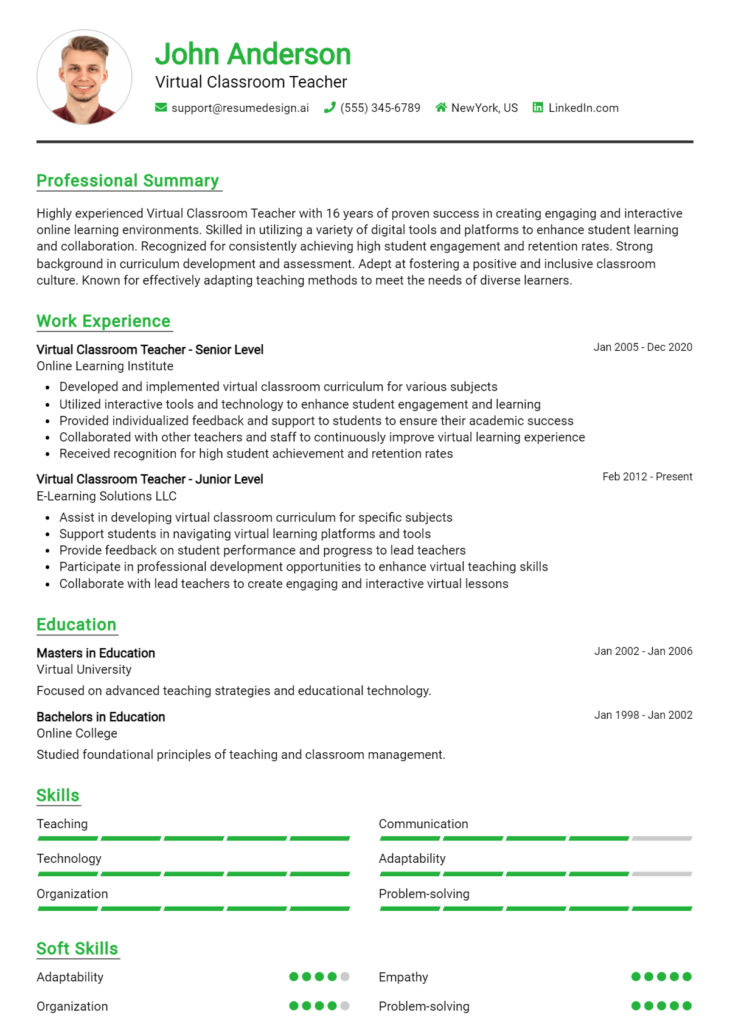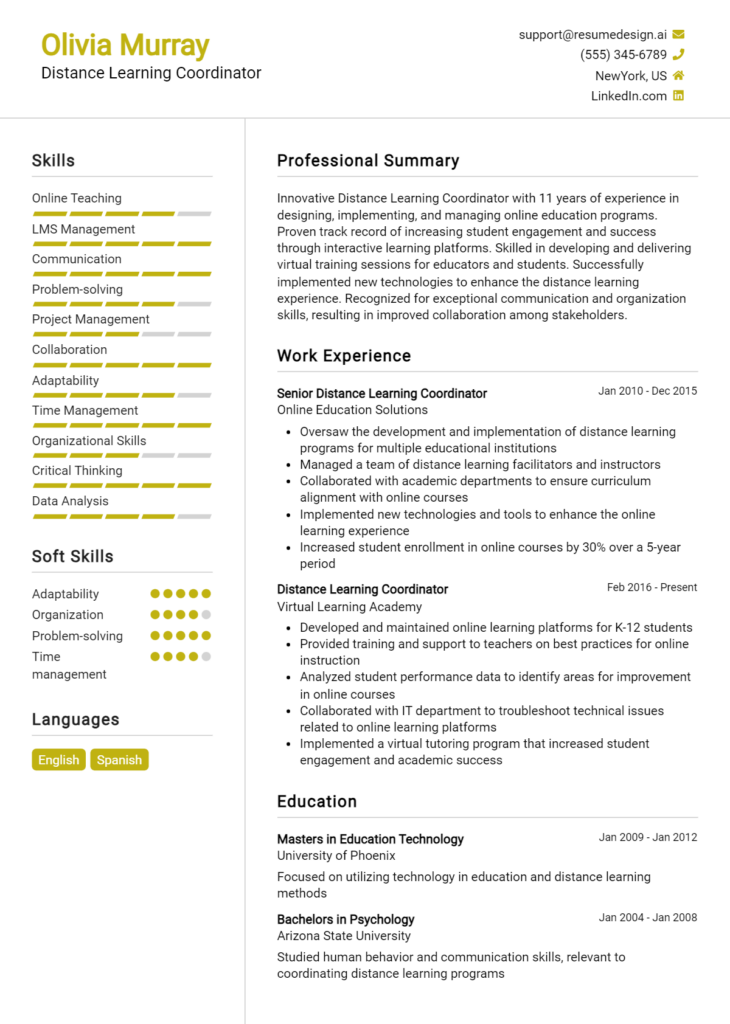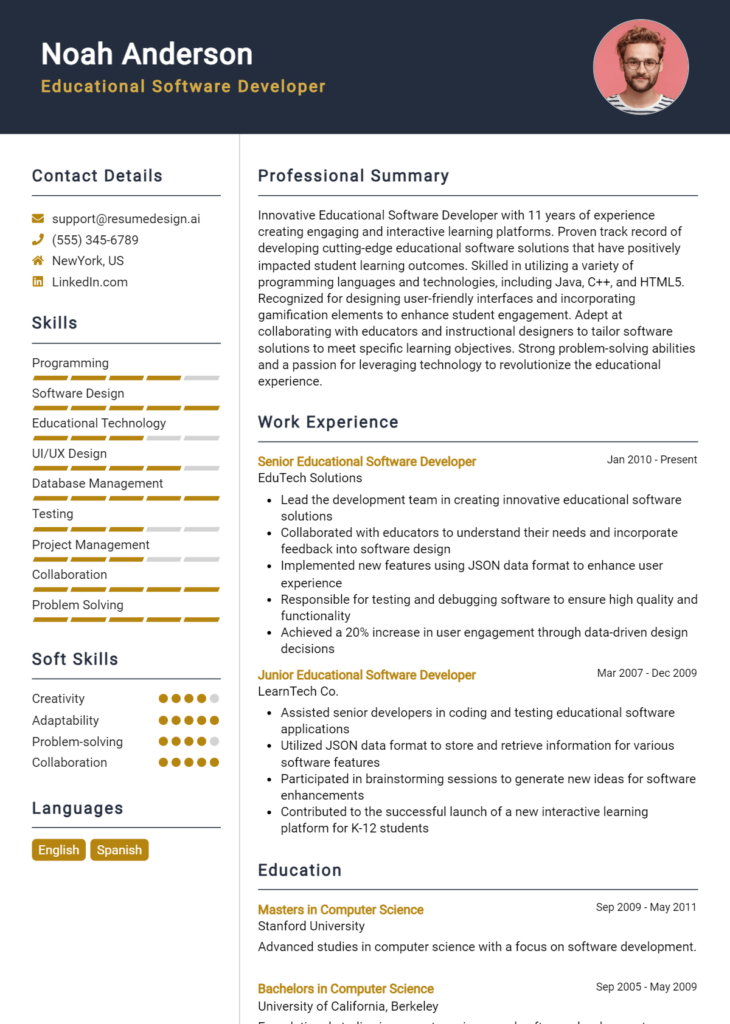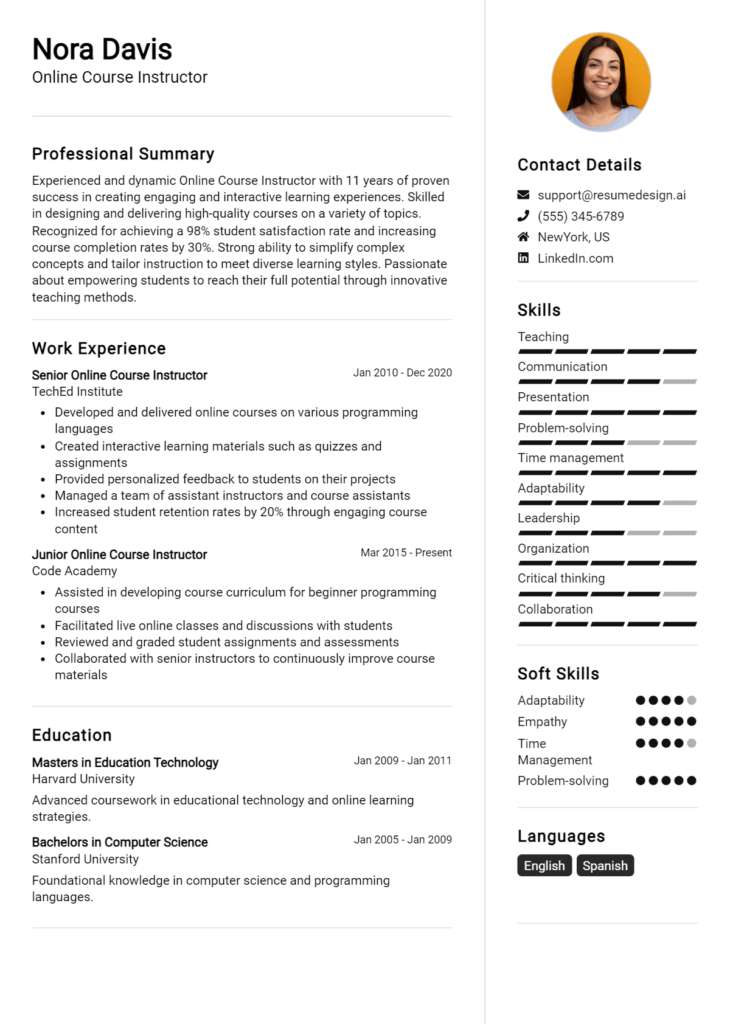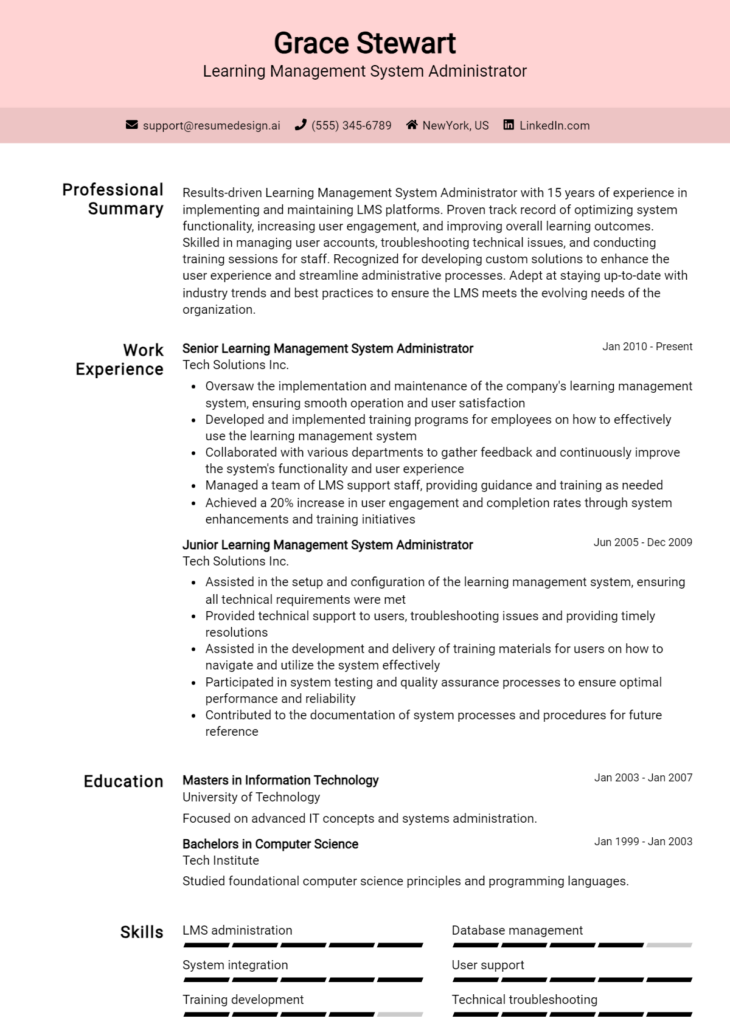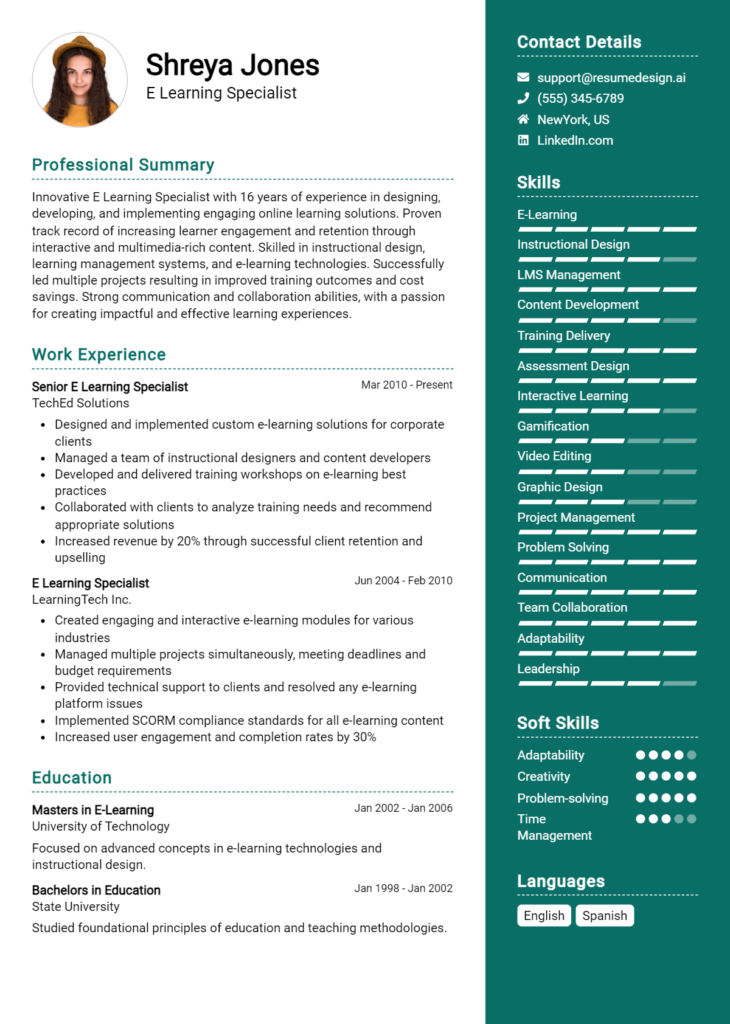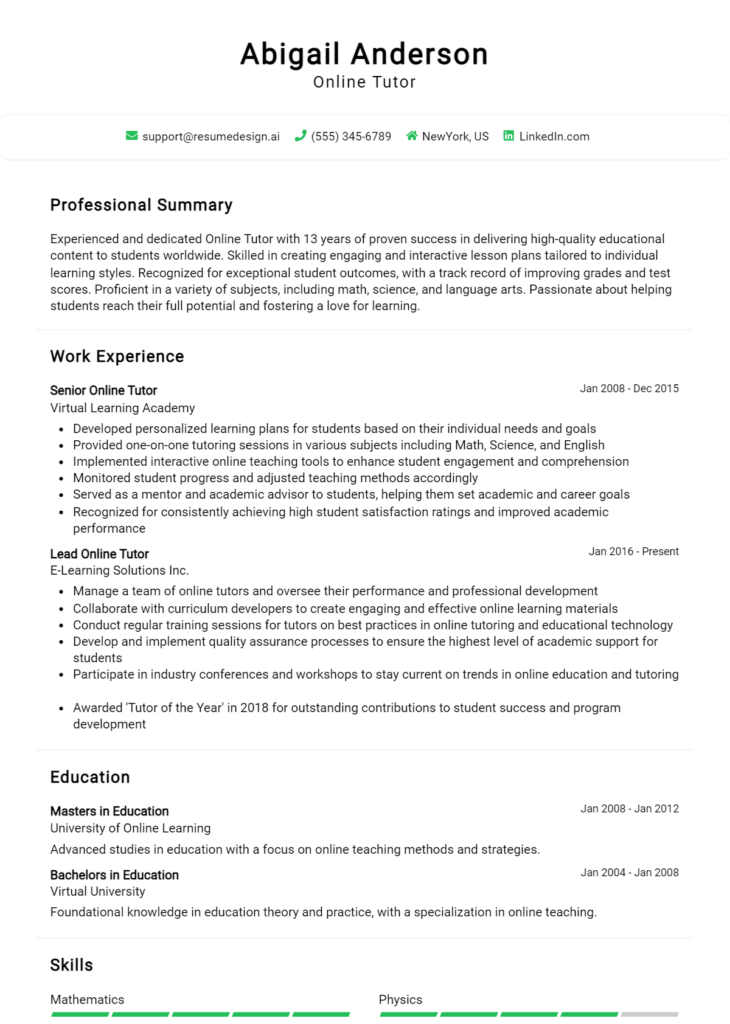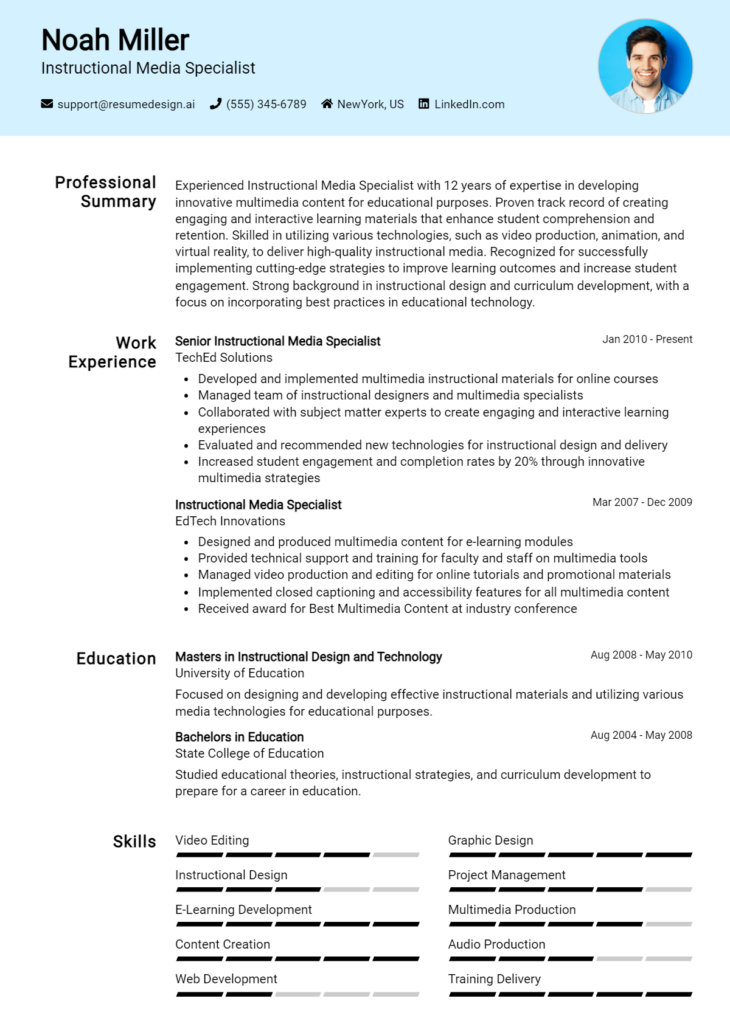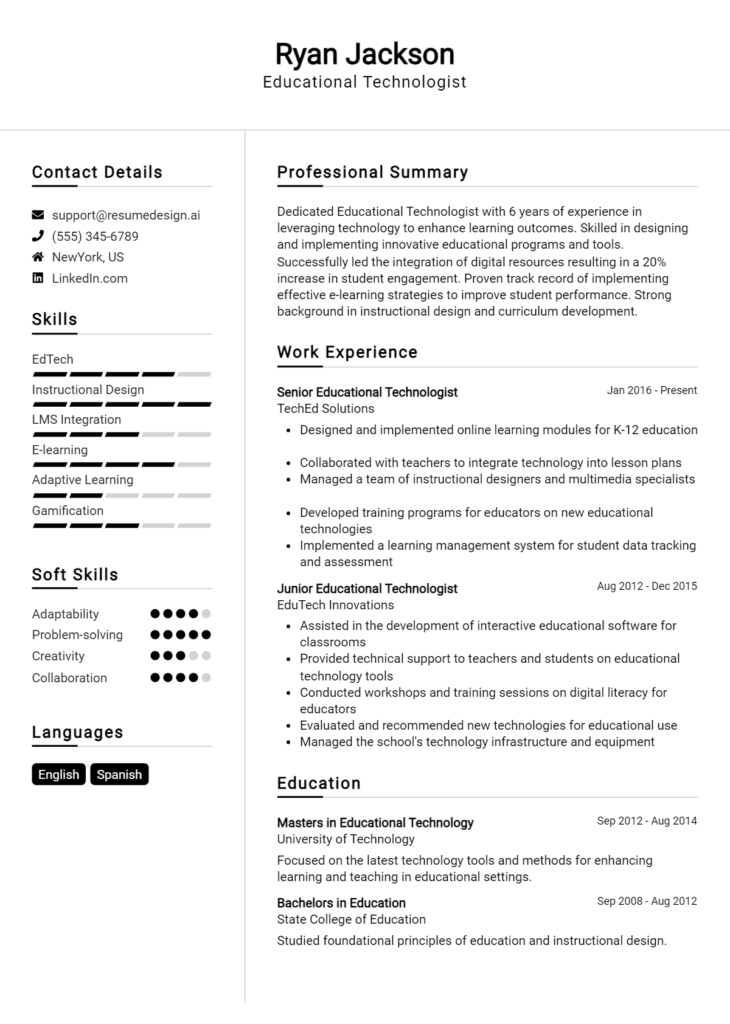Educational Game Designer Core Responsibilities
An Educational Game Designer is responsible for creating engaging and effective learning experiences through interactive games. This role requires a blend of creativity and technical expertise, as designers collaborate with educators, developers, and subject matter experts to ensure educational content aligns with learning objectives. Strong problem-solving skills and operational knowledge are essential for developing innovative game mechanics and user experiences. A well-crafted resume can effectively showcase these qualifications, highlighting how they contribute to the organization's educational goals.
Common Responsibilities Listed on Educational Game Designer Resume
- Design and develop educational game concepts and prototypes.
- Collaborate with educators to align game mechanics with learning objectives.
- Conduct user testing to gather feedback and improve gameplay.
- Integrate multimedia elements to enhance educational content.
- Analyze player data to assess learning outcomes and engagement.
- Stay updated on industry trends and educational methodologies.
- Lead cross-functional teams in the game development process.
- Prepare documentation and reports on game design and performance.
- Implement game mechanics that foster critical thinking and problem-solving.
- Manage project timelines and coordinate with stakeholders.
- Ensure adherence to accessibility standards in game design.
- Facilitate workshops for educators to promote game-based learning.
High-Level Resume Tips for Educational Game Designer Professionals
In the competitive landscape of educational game design, a well-crafted resume serves as your critical first impression to potential employers. It is your opportunity to showcase not only your skills and achievements but also your passion for creating engaging learning experiences. A resume that reflects your unique qualifications and understanding of both education and gaming can set you apart from other candidates. This guide will provide practical and actionable resume tips specifically tailored for Educational Game Designer professionals, ensuring you present your best self to prospective employers.
Top Resume Tips for Educational Game Designer Professionals
- Tailor your resume to match the job description by incorporating relevant keywords and phrases.
- Highlight your experience in both game design and educational theory to demonstrate your dual expertise.
- Quantify your achievements by including metrics, such as user engagement rates or educational outcomes from previous projects.
- Showcase a portfolio link that features your completed projects, prototypes, or any educational games you’ve developed.
- Emphasize industry-specific skills, such as proficiency in game design software (e.g., Unity, Unreal Engine) and understanding of learning management systems (LMS).
- Include relevant certifications or courses that enhance your qualifications in game design or educational technology.
- Utilize a clean and visually appealing layout that reflects your design sensibility while maintaining readability.
- Incorporate testimonials or endorsements from previous employers or collaborators to add credibility to your experience.
- Focus on your problem-solving skills and innovative approaches to educational challenges through game design.
- Allot space for a brief summary or objective statement that captures your career goals and passion for educational game design.
By implementing these tips, you can significantly enhance your resume's effectiveness and increase your chances of landing a job in the Educational Game Designer field. A polished and tailored resume not only highlights your qualifications but also demonstrates your commitment to creating impactful educational experiences through gaming, making you a standout candidate in this exciting industry.
Why Resume Headlines & Titles are Important for Educational Game Designer
In the competitive field of educational game design, a well-crafted resume headline or title serves as a critical tool for job seekers. This succinct phrase, placed prominently at the top of a resume, has the power to immediately grab the attention of hiring managers and summarize a candidate's key qualifications in a single impactful statement. A strong headline is concise, relevant, and directly related to the job being applied for, effectively setting the tone for the rest of the application. By communicating core strengths and expertise upfront, candidates can distinguish themselves from the competition and create a compelling first impression.
Best Practices for Crafting Resume Headlines for Educational Game Designer
- Keep it concise—aim for one impactful phrase.
- Make it role-specific to highlight your alignment with the job.
- Use action-oriented language to convey enthusiasm and proactivity.
- Incorporate relevant keywords from the job description.
- Focus on your unique strengths or notable achievements.
- Avoid vague terms; be specific about your expertise.
- Consider including quantifiable results or metrics when possible.
- Tailor the headline for each application to reflect the specific role.
Example Resume Headlines for Educational Game Designer
Strong Resume Headlines
Innovative Educational Game Designer with 5+ Years of Experience in Interactive Learning Solutions
Passionate Game Developer Specializing in Creating Engaging STEM Learning Experiences
Creative Educational Game Designer Committed to Enhancing Student Engagement Through Gamification
Weak Resume Headlines
Game Designer Looking for Work
Experienced Professional in Education
The strong headlines are effective because they clearly articulate the candidate's specific skills and experiences relevant to the educational game design role, making an immediate connection with hiring managers. They highlight unique strengths and include keywords that resonate with the job description. In contrast, the weak headlines fail to impress due to their vagueness and lack of specificity, making it difficult for hiring managers to gauge the candidate's qualifications quickly. By avoiding generalizations and instead focusing on impactful, role-specific statements, candidates can significantly enhance their chances of standing out in the application process.
Writing an Exceptional Educational Game Designer Resume Summary
A well-crafted resume summary is essential for an Educational Game Designer, as it serves as the first impression a hiring manager will have of a candidate. A strong summary quickly captures attention by showcasing key skills, relevant experience, and notable accomplishments specific to the educational gaming industry. This introductory paragraph must be concise and impactful, tailored to the job the candidate is applying for, effectively setting the tone for the rest of the resume and highlighting what makes the candidate a perfect fit for the role.
Best Practices for Writing a Educational Game Designer Resume Summary
- Quantify Achievements: Use numbers and metrics to demonstrate your impact in previous roles.
- Focus on Relevant Skills: Highlight specific skills that are directly applicable to educational game design.
- Tailor to the Job Description: Customize your summary to align with the requirements and keywords in the job posting.
- Showcase Unique Contributions: Emphasize what sets you apart from other candidates, including innovative projects or unique methodologies.
- Keep It Concise: Aim for 3-5 sentences that clearly convey your qualifications without unnecessary fluff.
- Use Action Verbs: Start sentences with strong action verbs to convey enthusiasm and initiative.
- Highlight Collaborative Experience: Mention teamwork or cross-functional collaboration, as these are vital in game development.
- Incorporate Passion: Express your enthusiasm for educational gaming and its potential to impact learning positively.
Example Educational Game Designer Resume Summaries
Strong Resume Summaries
Creative Educational Game Designer with over 5 years of experience developing interactive learning tools for K-12 students. Successfully increased student engagement by 35% through innovative game mechanics and adaptive learning techniques.
Results-driven Educational Game Designer skilled in Unity and C# with a track record of designing award-winning games that enhance critical thinking in learners. Developed a game that resulted in a 40% improvement in problem-solving skills among users.
Passionate about integrating technology in education, I have led cross-functional teams to create immersive educational experiences. My latest project, a multiplayer game for STEM learning, was recognized at the National Education Game Awards for its innovative use of collaboration.
Weak Resume Summaries
I am an Educational Game Designer looking for a new opportunity where I can use my skills.
Experienced in game design and interested in educational projects that are fun and engaging.
The strong resume summaries are effective because they include specific achievements, quantify results, and demonstrate a clear connection to the role of an Educational Game Designer. They highlight relevant skills and experience, making the candidate stand out. In contrast, the weak summaries lack detail, fail to mention any quantifiable outcomes, and appear generic, making it difficult for hiring managers to gauge the candidate's fit for the position.
Work Experience Section for Educational Game Designer Resume
The work experience section of an Educational Game Designer resume is critical as it serves as a comprehensive showcase of the candidate's technical skills, leadership abilities, and track record of delivering high-quality games. This section not only highlights relevant experience but also illustrates how the candidate has effectively managed teams and projects in the fast-paced educational gaming industry. By quantifying achievements—such as the number of games developed, user engagement statistics, or revenue generated—and aligning their experience with industry standards, candidates can significantly enhance their appeal to potential employers.
Best Practices for Educational Game Designer Work Experience
- Highlight specific technical skills used in game design, such as programming languages or software tools.
- Quantify achievements, such as increased user engagement or reduced development time.
- Emphasize collaborative projects that showcase teamwork and leadership capabilities.
- Include relevant metrics, like the number of downloads or user ratings, to demonstrate impact.
- Tailor your experience to align with job descriptions and industry standards.
- Use action verbs to convey initiative and results-driven outcomes.
- Incorporate feedback or testimonials from users or team members to add credibility.
- Showcase participation in professional development or industry events to indicate commitment to growth.
Example Work Experiences for Educational Game Designer
Strong Experiences
- Led a team of five designers to develop an educational mobile game that achieved over 100,000 downloads within the first month, increasing user engagement by 40% compared to previous titles.
- Implemented an adaptive learning algorithm in a project that boosted student retention rates by 25% across multiple platforms.
- Collaborated with educators to design curriculum-aligned games, resulting in a 90% satisfaction rate in user feedback surveys.
- Managed the end-to-end development process for a VR educational experience, which won the 'Best Educational Game' award at the International Game Developers Conference.
Weak Experiences
- Worked on various game projects.
- Assisted in designing educational materials.
- Participated in team meetings and discussions.
- Helped with game testing and feedback.
The strong experiences are considered effective because they provide concrete examples of achievements, demonstrate leadership and technical expertise, and quantify the impact of the candidate's contributions, making them compelling to hiring managers. In contrast, the weak experiences lack specificity and measurable outcomes, making it difficult for employers to gauge the candidate's actual contributions and skills in the field of educational game design.
Education and Certifications Section for Educational Game Designer Resume
The education and certifications section of an Educational Game Designer resume is crucial for establishing a candidate's academic background and professional qualifications. This section not only showcases relevant degrees and certifications but also emphasizes a commitment to continuous learning and staying updated within the industry. By providing specific coursework, industry-recognized certifications, and any specialized training, candidates can significantly enhance their credibility and demonstrate a strong alignment with the demands of the job role, making them more attractive to potential employers.
Best Practices for Educational Game Designer Education and Certifications
- Prioritize relevance by including degrees and certifications that directly relate to game design, education, or both.
- Provide detailed descriptions of relevant coursework that showcases skills in game development, instructional design, or user experience.
- Highlight advanced or industry-recognized credentials, such as a Master's degree in Game Design or certifications from recognized organizations.
- Include any specialized training in programming languages, design software, or educational technologies that enhance your skill set.
- Keep the formatting consistent to ensure clarity and professionalism throughout the section.
- Update the section regularly to reflect any new qualifications or certifications acquired.
- Consider adding relevant extracurricular activities or projects that support your educational background in game design.
- Limit the section to the most impactful and relevant items to maintain focus and avoid overwhelming the reader.
Example Education and Certifications for Educational Game Designer
Strong Examples
- Bachelor of Arts in Game Design, University of Southern California, 2021
- Certified Educational Game Designer (CEGD), International Game Developers Association, 2022
- Relevant Coursework: Game Mechanics, User Experience Design, and Interactive Learning Environments
- Advanced Diploma in Interactive Media Design, Digital Arts College, 2020
Weak Examples
- Bachelor of Science in Biology, State University, 2018
- Certification in Basic Computer Skills, Online Learning Platform, 2019
- High School Diploma, Local High School, 2015
- Old Certification in Graphic Design, National Institute of Design, 2017
The strong examples are considered relevant because they directly align with the skills and knowledge required for an Educational Game Designer, showcasing both academic qualifications and specialized training. In contrast, the weak examples highlight irrelevant degrees and certifications that do not contribute to the candidate's qualifications for the role. This demonstrates the importance of selecting educational credentials that enhance the candidate's profile and support their career aspirations in game design and education.
Top Skills & Keywords for Educational Game Designer Resume
As an Educational Game Designer, having the right skills is crucial to creating engaging and effective learning experiences. Your resume should highlight both hard and soft skills that demonstrate your ability to design, develop, and implement educational games. Employers look for candidates who not only possess technical expertise but also exhibit creativity, collaboration, and problem-solving skills. By showcasing your skills effectively, you can set yourself apart from other candidates and illustrate your potential contributions to a team focused on educational innovation.
Top Hard & Soft Skills for Educational Game Designer
Soft Skills
- Creativity
- Collaboration
- Communication
- Problem-solving
- Adaptability
- Empathy
- Time management
- Critical thinking
- Attention to detail
- Project management
- User-centered design
- Teamwork
- Leadership
- Open-mindedness
- Flexibility
Hard Skills
- Game design principles
- Programming languages (e.g., C#, JavaScript)
- Graphic design software (e.g., Adobe Creative Suite)
- Game development engines (e.g., Unity, Unreal Engine)
- Educational theory and pedagogy
- User experience (UX) design
- 3D modeling and animation
- Sound design and audio integration
- Level design
- Prototyping and wireframing
- Data analysis and assessment tools
- Agile development methodologies
- Quality assurance and testing
- Version control systems (e.g., Git)
- VR/AR development
- Mobile game development
- Research skills in educational trends
By emphasizing these skills in your resume, alongside relevant work experience, you can effectively convey your qualifications and readiness for a role in educational game design.
Stand Out with a Winning Educational Game Designer Cover Letter
I am writing to express my enthusiasm for the Educational Game Designer position at [Company Name], as advertised on [where you found the job listing]. With a robust background in both educational theory and game design, I am excited about the opportunity to create engaging, interactive experiences that facilitate learning and development. My combination of skills in storytelling, user experience design, and educational psychology positions me uniquely to contribute to innovative projects that inspire and educate players of all ages.
In my previous role at [Previous Company Name], I successfully led a team in the development of a series of mobile educational games that improved user engagement by 40% within the first six months of launch. By employing research-based strategies, I ensured that each game aligned with curriculum standards while still being fun and accessible. Collaborating closely with educators, I gathered valuable feedback that shaped the design process, enabling us to create a product that was not only entertaining but also effective in enhancing learning outcomes.
I am particularly drawn to [Company Name] because of your commitment to using technology to create impactful learning experiences. I admire your innovative approach to game design and your focus on creating inclusive content that resonates with diverse audiences. I am eager to bring my expertise in gameplay mechanics, narrative development, and player engagement to your team, ensuring that our educational games not only meet learning objectives but also spark curiosity and joy in players.
Thank you for considering my application. I look forward to the opportunity to discuss how my background and vision align with the goals of [Company Name]. I am excited about the prospect of contributing to your mission of transforming education through interactive play and would welcome the chance to further elaborate on my ideas and experiences.
Common Mistakes to Avoid in a Educational Game Designer Resume
Crafting a resume as an Educational Game Designer requires a blend of creativity and precision. However, many applicants often fall into common pitfalls that can undermine their chances of landing an interview. Understanding these mistakes can help you create a polished and compelling resume that highlights your unique skills and experiences. Below are some frequent errors to avoid when designing your resume for this specialized role:
Neglecting the Target Audience: Failing to tailor your resume to the specific job description can result in missed opportunities. Each game design role may require different skills and experiences, so customize your resume accordingly.
Lack of Specificity: Using vague language or general statements can make your resume less impactful. Be specific about your contributions to past projects, including technologies used, game mechanics designed, and educational outcomes achieved.
Ignoring Metrics: Omitting quantifiable achievements can weaken your case. Whenever possible, include numbers to demonstrate the success of your projects, such as user engagement rates or educational improvements resulting from your games.
Overloading with Jargon: While industry-specific terminology is important, overusing jargon can alienate readers. Ensure that your resume is accessible to both technical reviewers and hiring managers who may not be familiar with every term.
Inconsistent Formatting: A cluttered or inconsistent layout can detract from your content. Maintain a clean, professional design with uniform fonts, bullet points, and spacing to enhance readability.
Forgetting Soft Skills: Educational game design isn’t just about technical skills; soft skills like teamwork, communication, and adaptability are crucial. Highlight these qualities through your experiences to showcase your ability to collaborate effectively within a team.
Not Including a Portfolio: Failing to provide a link to your portfolio can limit your chances of demonstrating your work. Include a well-curated selection of your projects to give potential employers a tangible sense of your design capabilities.
Inadequate Proofreading: Spelling and grammatical errors can create a negative impression. Always proofread your resume multiple times or ask someone else to review it to ensure professionalism and attention to detail.
Conclusion
As an Educational Game Designer, your role is pivotal in shaping engaging and effective learning experiences through interactive gameplay. Throughout this article, we have covered essential skills and qualifications needed for the position, including proficiency in game design software, an understanding of educational pedagogy, and the ability to collaborate with educators and developers. We’ve also discussed the importance of creativity in designing captivating game mechanics that facilitate learning objectives while maintaining player engagement.
In conclusion, it is crucial to ensure that your resume reflects your unique skill set and experiences in the educational game design field. Take the time to review and enhance your resume to stand out to potential employers. Utilize resources such as resume templates, a resume builder, and resume examples to create a polished and professional application. Additionally, don’t forget to craft a compelling cover letter using our cover letter templates. Start refining your resume today to take the next step in your career as an Educational Game Designer!

